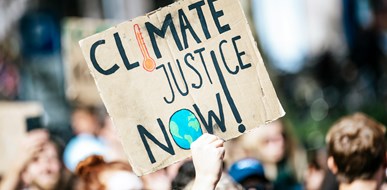[Call for Papers] Legal Advisory Opinions Shaping Climate Action and Human Rights
Published 30 July 2025
Credits: Photo by Markus Spiske on Unsplash
The Annual Conference of the NNHRR Working Group on Human Rights & the Climate Crisis, organized by Julie Fraser, Anneloes Kuiper, Otto Spijkers & Patricio Trincado Vera, will take place at Leiden University College (Anna van Buerenplein 301, The Hague) on 6 November 2025.
On 23 July 2025, the International Court of Justice (ICJ) issued an historic Advisory Opinion confirming that States have binding legal obligations under international law, including customary law and human rights law, to protect the climate system from anthropogenic greenhouse gas emissions. The Court emphasized that the adverse effects of climate change threaten core human rights, including the right to life, health, housing, food, water, and the right to a clean, healthy, and sustainable environment. This much anticipated Opinion was the result of years of advocacy started by the Pacific Island State of Vanuatu, which is already experiencing the existential harm of the climate crisis.
This initiative has triggered other requests for similar Advisory Opinions. For example, on 3 July 2025, the Inter-American Court on Human Rights (IACtHR) issued a far-reaching Advisory Opinion on the climate emergency and human rights as requested by Chile and Colombia. Besides confirming its previous case-law on environmental issues, the IACtHR introduced several groundbreaking elements. Most notably, the Court (1) declared the obligation to not cause irreversible damage to the climate and to the environment as a jus cogens norm, (2) stated that the right to a healthy climate is a substantive aspect of the right to a healthy environment, and (3) introduced the thesis of Rights of Nature into the Inter-American systems by considering Nature as a subject of rights protected under the American Convention on Human Rights. Additionally, in May 2025, a request was put forward by civil society to the African Court of Human and People’s Rights for an Advisory Opinion on the human rights obligations of African states in the context of climate change.
Suggested Topics
Suggested topics may include but are not limited to:
The right to a healthy environment
- Its legal status and implications under customary and treaty law
- Comparison between environmental law and human rights law
- Regional perspectives (e.g., Inter-American, African Charter, European Court)
- Jus Cogens character of the prohibition to cause irreversible damage to the climate
Climate change and human rights
- Impacts of climate change on the rights to life, health, food, water, housing, privacy, and culture
- Climate displacement and the rights of migrants and refugees (non-refoulement)
- Gender, Indigenous Peoples, children, persons with disabilities and intersectional climate vulnerability
- Emerging rights like the right to a healthy climate, and the right to energy
Future generations and rights of Nature
- Legal recognition of the rights of future generations
- Legal recognition of the rights of Nature
- Intergenerational equity and human rights
- Pro Natura principle
- Procedural and substantive innovations to protect intergenerational rights
Accountability and reparations
- Legal consequences of wrongful acts and omissions under human rights law
- Victim-centred approaches to climate harm and reparations
- Extraterritorial obligations in the context of climate damage
- Strategic use of international advisory opinions in domestic and regional climate litigation
- Ecocide
Duty of cooperation and global justice
- Collective human rights obligations including international cooperation
- Decolonisation and climate justice
- Climate finance, loss and damage, and technology transfer as human rights duties
- The role of small islands and developing States in reshaping legal accountability
- Principle of common but differentiated responsibilities
- Just energy transition
Related or other relevant (national) perspectives are also welcome.
Submission Guidelines
Submissions are welcome from scholars, practitioners, and activists across disciplines and career stages. Both NNHRR members and non-members are welcome to submit an abstract.
Abstracts should be submitted by 15 September 2025. Participants will be notified about the outcome of the selection process as soon as possible, but at the latest in early October 2025.
Submissions and inquiries should be directed to o.spijkers@luc.leidenuniv.nl, with the subject line: “NNHRR Working Group on Human Rights & the Climate Crisis – Abstract Submission” Submissions must be in a Word document (.doc or .docx). Submissions must include (1) the title; (2) speaker(s) name(s), their institutional affiliation(s), and contact information; (3) the abstract (max 500 words); and (4) a short bio (max 200 words) of the speaker(s).
We look forward to welcoming participants in person for this conference, which will be held onsite in The Hague, Netherlands. Before you submit an abstract proposal, please ensure that you are able to travel to The Hague. Online participation is not possible. Submissions may be co-authored, if at least one author will attend and present in person.
The conference is free of charge. Lunch will be provided. The Working Group is unfortunately unable to provide any type of funding or financial assistance for travel and accommodation. Selected speakers will thus be expected to bear the costs of their own travel and accommodation.


